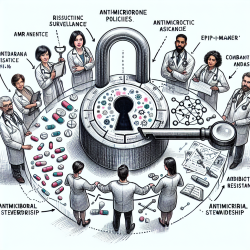Introduction
Antimicrobial resistance (AMR) is a growing concern in healthcare settings worldwide. The COMBACTE-Magnet EPI-Net COACH project has provided valuable insights into how AMR surveillance can be effectively linked to antibiotic policy to improve patient outcomes and combat resistance. This blog explores the key findings and recommendations from this research, offering practical guidance for healthcare practitioners looking to enhance their antimicrobial stewardship (AMS) efforts.
The Importance of AMR Surveillance
High-quality and timely AMR surveillance is crucial for administering appropriate empirical antimicrobial therapy and implementing AMS programs. According to the research, a systematic approach to collecting, analyzing, and reporting AMR data can significantly impact the effectiveness of AMS interventions. The study emphasizes the need for a more integrated process in developing procedures to report AMR surveillance data, extending beyond acute-care institutions to include long-term care, outpatient, and veterinary settings.
Key Recommendations for Practitioners
- AMS Team Composition: A multidisciplinary team, including infectious diseases specialists, clinical microbiologists, and pharmacists, is essential for implementing effective surveillance systems and informing AMS interventions.
- Infrastructure Requirements: Adequate laboratory infrastructure and information technology platforms are necessary to integrate laboratory and clinical data, ensuring comprehensive AMR surveillance.
- Data Stratification: AMR data should be stratified by hospital unit, specimen type, and patient demographics to provide more accurate and actionable insights.
- Reporting Frequency: AMR surveillance data should be updated at least annually, with more frequent updates in response to policy changes or outbreaks.
- Resistance Thresholds: Establishing clear resistance thresholds is vital for guiding empirical antimicrobial treatment recommendations, particularly in high-risk settings.
Encouraging Further Research
While the COMBACTE-Magnet EPI-Net COACH project provides a robust framework for linking AMR surveillance to antibiotic policy, further research is needed to refine these recommendations and explore their application in various healthcare settings. Practitioners are encouraged to contribute to this ongoing research effort by sharing their experiences and insights.
Conclusion
The integration of AMR surveillance into antibiotic policy is a critical step in combating antimicrobial resistance and improving patient outcomes. By implementing the recommendations from the COMBACTE-Magnet EPI-Net COACH project, healthcare practitioners can enhance their AMS programs and contribute to a more effective global response to AMR.
To read the original research paper, please follow this link: Linking antimicrobial resistance surveillance to antibiotic policy in healthcare settings: the COMBACTE-Magnet EPI-Net COACH project.










